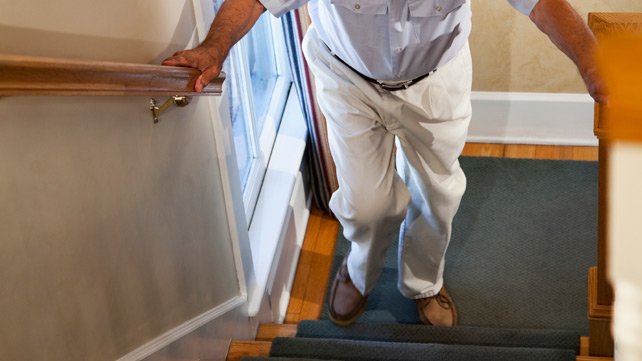Expectations After Knee Replacement Surgery
After knee replacement surgery, you can expect to be in the hospital for about three days, with physical therapy taking place for about two months after that.
You’ll need to make an effort to keep your leg elevated as much as possible and to follow up with your doctor on the schedule they provide you.
Here are some expectations you should have after knee replacement surgery to ensure the best results from your procedure.
1) Pain will be reduced
Though knee replacement is often successful in relieving pain and restoring mobility, there are no guarantees.
Most people have improvement after surgery, but that doesn’t mean you’ll have no pain at all. Pain after surgery will be different from what you may have experienced before.
It should be more manageable than your previous knee pain, but initially, it can still cause you discomfort and a lack of sleep.
Exercise will help reduce your overall level of pain as well as promote circulation and muscle tone in your thigh muscles.
However, even if you don’t start exercising for several months after surgery, most people experience reduced pain with regular use of their new knee joint.
2) Walking will be easier
You should have less pain and be able to walk more easily, even with a walker. If you don’t feel up to walking, that’s okay.
You can still exercise by using a stationary bike or elliptical machine. Talk with your doctor about how much and what types of exercise you can do during your recovery period, so you get back on track as soon as possible.
A physical therapist can also help you develop an exercise plan during your recovery that keeps you active without adding stress to your knees while they heal.
3) Functionality will improve
The surgical team will have removed your damaged knee joint and replaced it with a metal and plastic artificial joint.
With time, your leg muscles will get stronger and you’ll learn to manage around your knee replacement. And when you do, you’ll experience a functional improvement in your life—you may even be able to travel again!
It can take up to six months for muscle strength and function to return after surgery, but it may take longer depending on how active you are before surgery.
If you’re an athlete or otherwise very active pre-surgery, don’t expect all of that activity back immediately after knee replacement.
4) Goals should be reviewed
Before undergoing knee replacement surgery, you and your doctor should review your goals. For some people, pain relief may be their primary goal, and replacing a joint that is worn out with one that will last longer may not be their main concern.
Talk with your doctor about what’s most important to you—and whether knee replacement surgery is right for you.
It’s also important to make sure that your expectations match those of your surgeon, and that they meet regularly while you’re recovering from surgery.
Otherwise, it might cause problems down the road and when you’re trying to recover from an already difficult procedure.
5) Weight control should be easier
Living with knee arthritis can make it difficult to maintain a healthy weight. Research suggests that being overweight or obese could lead to an earlier need for a knee replacement.
Trying to maintain a healthy weight through diet and exercise is important to help prevent future joint problems and ensure your total knee replacement provides years of mobility.
Weight control should become a priority when living with osteoarthritis, rheumatoid arthritis, or another type of degenerative joint disease.
It's easier to lose weight because it's less painful and more mobile after total knee replacement. A healthy weight also means an overall improvement in health.
6) Emotional support is needed
Recovery is a very physical process. Recovery can be mentally grueling at times, as well. If your loved one has knee replacement surgery, it’s important to give them some extra support in other areas of their life too.
The most effective way to do that is by being more aware of what they need and ensuring they have it. This can be as simple as doing more housework or offering to get groceries while they recover from knee replacement surgery; but even if you don’t live with your loved one, you can offer emotional support by keeping in touch and encouraging them throughout their recovery process (just maybe don’t call every hour).
Because if your loved one is going through a tough time, let them know you're there for them no matter what.
7) Pain won’t go away overnight
While knee replacement surgery is often a very effective treatment for people with severe knee pain and mobility issues, you can’t expect to get better overnight.
You’ll be in pain before and after your surgery, though most of it will subside quickly. And even with a successful recovery, your knees will never feel exactly like they did before arthritis or other conditions began affecting them.
Instead, think of your new normal as something slightly different than what you had before—and embrace it as an improvement. After all, everyone is different!
8) Recovery may take longer than expected
If your doctor advises more time, follow his or her instructions instead of aiming for an earlier recovery date—which could delay progress, cause discomfort and increase your risk of complications down the road.
That said, if you’re feeling good after 10 days or two weeks in a knee brace, push yourself to walk farther and faster!
The same goes for driving: if it feels safe for you to do so (talk with your doctor first), go ahead and get behind that wheel when you feel ready!
9) Stairs are now a challenge
First and foremost, do not climb stairs until you are cleared to do so by your doctor. Climbing stairs will be difficult because your new knee joint is not as flexible as your old one.
Ask other people for help if you need to go up or down stairs; don’t try to tackle them alone when you first have surgery.
10) Patience is the key
It takes time to heal. Knees may be stiff and painful for up to 6 weeks after surgery. The healing process varies from person to person and also from age and other medical conditions.
If complications occur, your doctor will tell you what to expect in terms of recovery time. Stitches are removed 10-14 days after surgery, but in some cases, doctors might recommend leaving the stitches longer.
Many people feel good enough to get back to work about three weeks after surgery, but all cases are different, so check with your doctor.
All information on this website (https://www.doctor-pal.com) is published in good faith and for general information purposes only. Dr. Indranil Pal does not guarantee the completeness, reliability, or accuracy of this information. Actions based on the information found on this website are entirely at your own risk. Doctor Pal shall not be liable for any loss and/or damage associated with the use of our website. Contact your doctor who can advise you on your health and illness.











